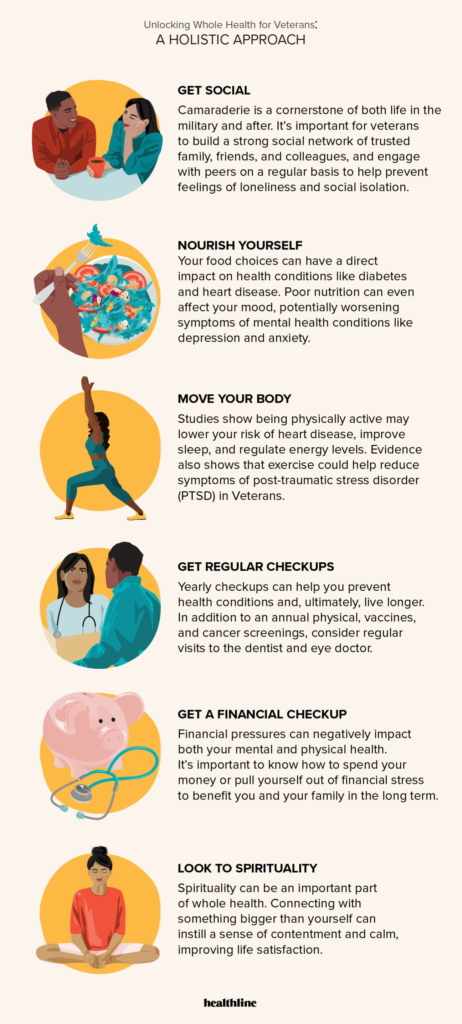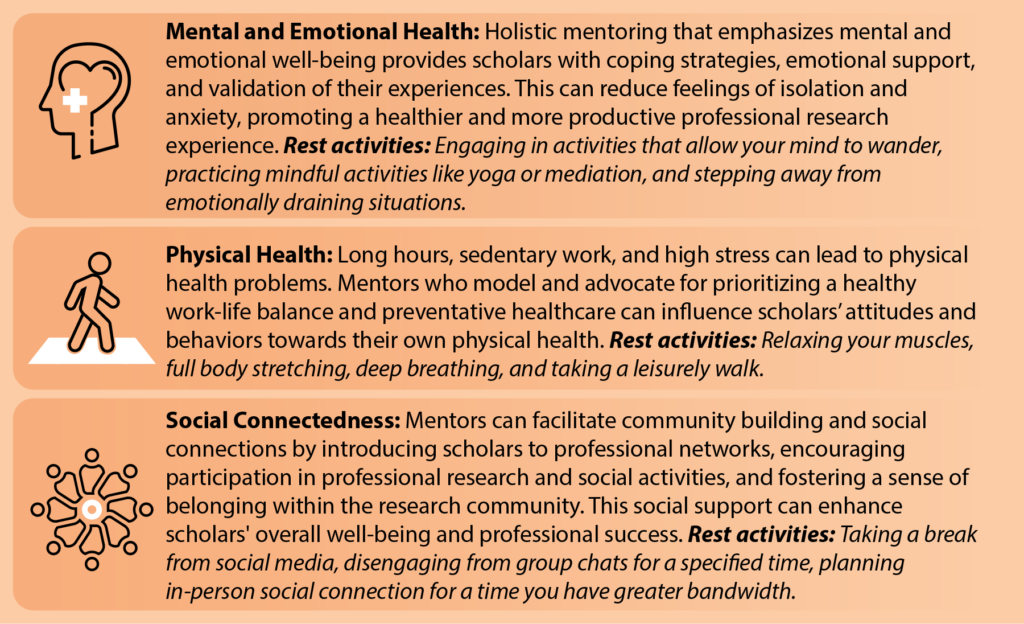Holistic Self-Care Simple Practices for Whole-Body Wellness
The contemporary approach to self-care has evolved significantly, emphasizing the necessity for a holistic perspective that encompasses physical, emotional, and spiritual well-being. As individuals navigate an increasingly complex world characterized by stress and health challenges, the integration of holistic self-care practices becomes paramount in fostering whole-body wellness. Programs rooted in wellness philosophy, such as those founded on Ayurvedic principles, have demonstrated significant benefits, including improvements in spirituality and reductions in anxiety (Chopra et al.). Furthermore, the importance of cultivating a supportive environment through social connections and mentoring cannot be overlooked, as it plays a critical role in promoting employee well-being and enhancing productivity (Lawson et al.). Strategies that engage various dimensions of health, including those depicted in , illustrate how comprehensive self-care can lead to more resilient individuals. This essay aims to explore simple yet effective practices that contribute to holistic health, emphasizing their transformative potential in everyday life.
A. Definition and Importance of Holistic Self-Care
Holistic self-care encompasses a comprehensive approach to wellness that integrates physical, mental, and spiritual health, emphasizing the interconnectedness of various aspects of an individual’s life. By addressing these dimensions, holistic self-care not only fosters resilience but also supports overall well-being, allowing individuals to manage stressors more effectively. The recognition of this integrative model is crucial, especially in contexts like ministry where leaders face significant challenges, as highlighted by the introduction of the Star Model, which provides a framework for achieving life-balance and resilience through self-awareness and intentional practices (Williams et al.). Additionally, an infographic depicting the holistic health approach underscores the necessity of engaging with multiple wellness dimensions, revealing strategies that enhance life quality, particularly for populations dealing with specific hardships . The importance of holistic self-care therefore lies in its potential to nurture a balanced, thriving life that is essential for achieving whole-body wellness.
II. Physical Wellness
Physical wellness is a fundamental aspect of holistic self-care that significantly impacts overall well-being and quality of life. Engaging in regular physical activity not only enhances cardiovascular health but also improves mental and emotional resilience, fostering greater self-awareness and efficacy. The concept of self-care extends beyond mere exercise, incorporating nutrition, sleep hygiene, and stress management techniques, which collectively contribute to a balanced lifestyle. Research indicates that healthier employees are more productive and engaged, underscoring the necessity for organizations to prioritize wellness initiatives, such as health and wellness coaching, that empower individuals to adopt life-enhancing habits ((Lawson et al.)). Moreover, adopting a comprehensive approach to physical wellness can cultivate resilience against burnout and chronic stress, a vital consideration in todays fast-paced environment ((Chapman et al.)). The interconnectedness of physical health with mental and emotional wellness illustrates the importance of integrating practices that support whole-body wellness, such as those demonstrated in .
A. Simple Practices for Enhancing Physical Health
A comprehensive approach to enhancing physical health often begins with the incorporation of simple yet effective practices into daily routines. Engaging in regular physical activity, such as walking or participating in a sport, can significantly improve cardiovascular health and foster emotional stability. The benefits of nutrition cannot be understated; consuming a balanced diet rich in whole foods supports optimal bodily functions. Furthermore, prioritizing adequate rest and recovery periods is crucial for maintaining energy levels and reducing stress. The emphasis on these practices reflects a holistic understanding of wellness where both mental and physical health are interconnected. Initiatives like wellness coaching have been shown to boost awareness about such practices, as they encourage individuals to recognize stress management and self-care as vital components of health. This is further illustrated in , which outlines a multifaceted approach to wellness, emphasizing the importance of various health dimensions.
III. Mental and Emotional Wellness
Mental and emotional wellness represents a vital component of holistic self-care, encompassing a balance of psychological resilience, social connectedness, and emotional regulation. Evidence suggests that engaging in wellness programs grounded in mind-body-spirit principles enhances various dimensions of psychosocial well-being, including mindfulness and spirituality, while also reducing anxiety and depressive symptoms ((Chopra et al.)). These interconnected dimensions highlight the necessity for individuals to cultivate mental health strategies alongside their physical habits. Furthermore, a holistic perspective inherently aligns with social work values, emphasizing a comprehensive understanding of human experience ((Robinson et al.)). Illustrating the importance of these connections, presents an actionable framework tailored for veterans, integrating social engagement, nutrition, and spiritual practices to address mental health challenges. By adopting such holistic approaches, individuals can foster not only their mental and emotional wellness but also their overall well-being, demonstrating the profound impact of integrated self-care practices.
A. Techniques for Managing Stress and Promoting Mental Clarity
A multifaceted approach to managing stress and promoting mental clarity is essential for holistic self-care. Techniques such as mindfulness meditation and health coaching have been shown to cultivate self-awareness, enabling individuals to recognize stress triggers and implement practical coping strategies. Notably, mindfulness practices have been particularly effective in improving not only relaxation and concentration but also athletic performance among college athletes, thereby affirming their relevance across various demographics (Braatz et al.). Furthermore, organizations can benefit from prioritizing employee well-being through supportive frameworks, as higher well-being is linked to enhanced engagement and productivity (Lawson et al.). Together, these techniques empower individuals to build resilience by embracing a comprehensive view of health. Visual representations, such as those found in , illustrate the interconnected aspects of mental, emotional, and social well-being, reinforcing the notion that a collaborative approach to self-care can significantly improve overall mental clarity and health.
The integration of holistic self-care practices significantly contributes to whole-body wellness by addressing the interconnected dimensions of health: physical, mental, emotional, and spiritual. As evidenced by research, participants in wellness programs that adopt a mind-body-spirit approach report marked improvements in psychosocial well-being, including increased mindfulness and reduced anxiety, underlining the holistic model’s efficacy (Chopra et al.). Furthermore, the lack of a unified definition of holistic well-being in social work necessitates ongoing dialogue and education to fully harness its potential (Robinson et al.). Effective strategies, depicted in the structured overview of holistic health , serve as practical guides to fostering personal and community wellness. Overall, embracing holistic self-care not only enriches individual lives but also cultivates resilience and interconnectedness within communities, advocating for a comprehensive approach to health that transcends traditional boundaries.
A. The Impact of Holistic Self-Care on Overall Well-Being
Holistic self-care practices play a vital role in enhancing overall well-being by promoting a comprehensive approach that considers the interconnectedness of mind, body, and spirit. Engaging in activities that nurture these dimensions—such as mindfulness, meditation, and physical exercise—can lead to significant improvements in emotional and psychological health. For instance, programs inspired by Ayurvedic principles have demonstrated effectiveness in broadening participants spirituality and mindfulness while simultaneously reducing anxiety and depressive symptoms ((Chopra et al.)). This holistic perspective aligns with holistic values inherent in social work, highlighting the necessity for a consistent understanding of what constitutes wellness ((Robinson et al.)). As individuals adopt simple yet profound self-care practices, they not only enhance their personal health but also foster resilience and adaptability, reinforcing the concept that true well-being cannot be compartmentalized but is instead a multifaceted integration of various health dimensions.








Cool Post.